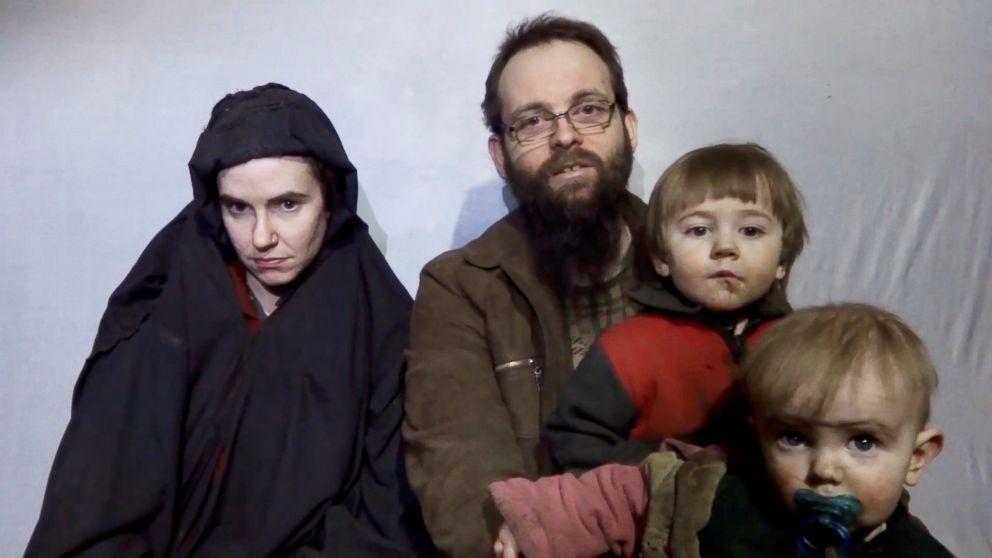Former Taliban hostage Joshua Boyle jailed after arrest on assault charges in Canada
Joshua Boyle arrived home with his American wife and three children in October.
— -- Former Taliban hostage Joshua Boyle was charged Monday in Canada with 15 criminal offenses including multiple allegations of assault since he arrived home with his American wife and three children in October following five years of captivity in Pakistan.
Boyle, 34, appeared in a hearing in Ottawa's criminal court on New Year's Day, court records show. He was denied immediate release and his next hearing will be Wednesday, according to a family member.
Boyle’s American wife, Caitlan Coleman Boyle, said in a statement, "I can’t speak about the specific charges, but I can say that ultimately it is the strain and trauma he was forced to endure for so many years and the effects that that had on his mental state that is most culpable for this.
“Obviously, he is responsible for his own actions,” she wrote in the statement, “but it is with compassion and forgiveness that I say I hope help and healing can be found for him. As to the rest of us, myself and the children, we are healthy and holding up as well as we can.”

The 15 charges filed Monday by the Ottawa Police Service include multiple allegations of assault, including physical and sexual assault of a woman, physical assault of a child and unlawful confinement, between October and December and misleading police over the weekend "to divert suspicion from himself."
The Canadian court issued an order prohibiting the publication of information that identifies the alleged victims in Canada. As a general policy, ABC News does not name victims in cases of alleged sexual assault.
Joshua Boyle's defense lawyer, Eric Granger, in a statement to ABC News said his client "is presumed innocent."
"He's never been in trouble before. No evidence has been provided yet, which is typical at this early stage. We look forward to receiving the evidence and defending him against these charges," Granger added.
The longtime Canadian anti-war activist raised in Perth-Andover and his wife of Stewartstown, Pennsylvania, disappeared hiking through eastern Afghanistan in 2012 and were held by the Taliban's Haqqani Network for five years until their sudden release in October, just as American commandos were staging a rescue operation. The circumstances of their release remain unclear.
Caitlan Coleman Boyle, who was six months pregnant at the time of their capture more than five years ago, would give birth to three children in captivity. In an interview with ABC News in November, she said she and her family endured brutal treatment at the hands of their captors, including what the couple alleged was a "forced abortion" and rape by their Haqqani guards.
The newly freed family arrived in Toronto on Oct. 13. The initially stayed with Joshua Boyle's parents in Smiths Falls, Ontario, but they soon moved into a hotel in Ottawa. Recently the Boyles moved into a rented apartment and told ABC News they were eager to make it a home.
Just before Christmas, Joshua Boyle tweeted photos of his family meeting with Canadian Prime Minister Justin Trudeau. Last week, after President Donald Trump listed freeing the hostages as an accomplishment, Joshua Boyle finally offered his appreciation to the American leader, tweeting, "Thank you Mr. President."
Joshua Boyle was known in Canada for his activism even before becoming a hostage of the Haqqani Network. He was previously married to one of Canada's most outspoken pro-jihadi women, Zaynab Khadr, whose two brothers were imprisoned at the Guantanamo Bay detention camp, but were later released.
U.S. intelligence officials long expressed doubts to ABC News about Joshua Boyle's motives in traveling to Afghanistan in 2012. Joshua Boyle told ABC News last month that those doubts were unfounded and referred to his Haqqani captors as "criminal miscreants."
American officials put aside their skepticism of Joshua Boyle in offering the family assistance in leaving Pakistan and since they settled in Ottawa, including offers of psychological counseling to adjust from captivity, they have told ABC News.




